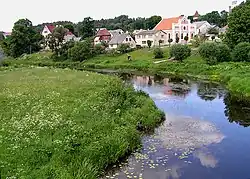upe
Guaraní
Latgalian

Etymology
From Proto-Balto-Slavic [Term?]. Cognates include Latvian upe and Lithuanian upė.
Pronunciation
- IPA(key): [ˈupʲæ]
- Hyphenation: u‧pe
Declension
References
- M. Bukšs, J. Placinskis (1973) Latgaļu volūdas gramatika un pareizraksteibas vōrdneica, Latgaļu izdevnīceiba, page 129
- A. Andronov, L. Leikuma (2008) Latgalīšu-Latvīšu-Krīvu sarunu vuordineica, Lvava, →ISBN, page 18
Latvian

Etymology
In principle, from Proto-Balto-Slavic *apē-, from Proto-Indo-European *h₂ep-, *h₂op- (“(flowing) water, river”). Cognates include Lithuanian ùpė, dialectal ũpė, upìs, ùpis, Old Prussian ape (“river”), apus (“(water) well”), Sudovian upa (“river”), Hittite ẖap(a) (“river”), Sanskrit आपः (āpaḥ, “water (plural)”), Tocharian A, Tocharian B āp (“water”). The u in Latvian upe (and Lithuanian upė), instead of the expected a, as in the Old Prussian cognate, is difficult to explain. Some suggest that upe was influenced by other words (e.g., Old Prussian wupyan (“cloud”)), others that it is not cognate with Old Prussian ape, but rather a reflex of Proto-Indo-European *eup-, *ūp-, *up- (“to call, to cry, to yell”), or then a specific Eastern Baltic word without a Proto-Indo-European etymology.[1]
Noun
upe f (5th declension)
- (geography) river (permanent watercourse)
- strauja, lēna upe ― fast, slow river
- kalnu, līdzenumu upe ― mountain, lowland river
- upes gultne ― riverbed
- upes ieleja ― river valley
- upes baseins ― river basin
- upju sistēma ― river system
- upes pietekas ― river tributaries
- upes ieteka, grīva ― river estuary, mouth
- upes izteka ― river source, headwaters
- upes augštece, lejtece ― upriver, downriver
- upju transports ― fluvial transportation
- upju kuģniecība ― river lines
Declension
References
- Karulis, Konstantīns (1992) “upe”, in Latviešu Etimoloģijas Vārdnīca (in Latvian), Rīga: AVOTS, →ISBN
Lithuanian
Pronunciation
- (upè) IPA(key): [ʊˈpʲɛ]
- (ùpe) IPA(key): [ˈʊpʲɛ]
Portuguese
Verb
upe
- inflection of upar:
- first/third-person singular present subjunctive
- third-person singular imperative
Spanish
Verb
upe
- inflection of upar:
- first/third-person singular present subjunctive
- third-person singular imperative
Yoruba
Alternative forms
- ìpè (Standard Yoruba)
Pronunciation
- IPA(key): /ù.k͡pè/
Noun
ùpè
- (chiefly CY and SEY) pronunciation, calling
- Synonym: ùké
- (chiefly CY and SEY) call, invitation, summon
- Synonym: ùkésí
- (chiefly CY and SEY) traditional horn or trumpet
- Synonyms: ùfèrè, kàkàkí